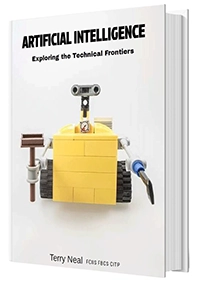 | AIP | Consulting | Workshops | About |
Arti|cial Intelligence (AI) has rapidly emerged as a transformative technology, revolutionizing various industries and reshaping the way we live and work. However, as AI continues to advance at an unprecedented pace, one pressing challenge that we all face is the AI skills gap.
The AI skills gap refers to the shortage of professionals possessing the necessary expertise to implement, develop, and maintain AI systems. With the ever-increasing demand for AI solutions across various industries, there is a widening gap between the demand for AI skills and the available talent pool.
The goal of this section is to highlight key ways in which AI can be employed to assist various job roles, not by replacing them but by enhancing and accelerating them. By embracing and educating ourselves about AI we can work towards equipping ourselves with the necessary knowledge and competencies to thrive in the field of AI
How could information security roles benefit from the use of AI?
To effectively utilise AI in information security, it's crucial to continually update and fine-tune AI models, keep them aligned with emerging threats, and ensure that human expertise is integrated into the decision-making process. Additionally, organisations should consider ethical and privacy considerations when implementing AI in security to avoid potential risks.
How could support desk roles benefit from the use of AI?
Incorporating AI into support desk operations can lead to increased efficiency, reduced response times, improved customer satisfaction, and cost savings. However, it's important to strike the right balance between automation and human interaction to ensure that customer needs are met effectively. Support desk staff should be trained to work alongside AI tools to provide the best possible customer service.
How could content creators benefit from the use of AI?
It's important to note that while AI can be a powerful tool for content creators, it should complement human creativity and judgment rather than replace them entirely. Content created with AI should still be reviewed and refined by humans to ensure quality and authenticity. Additionally, ethical considerations, such as transparency and user privacy, should be taken into account when using AI in content creation.
How could marketers benefit from the use of AI?
Incorporating AI into marketing strategies can significantly enhance efficiency, customer engagement, and overall campaign performance. However, it's essential to choose the right AI tools and approaches that align with specific marketing goals and objectives. Additionally, data privacy and ethical considerations should be a part of any AI-driven marketing strategy.
How could product developers benefit from the use of AI?
By incorporating AI into the product development process, developers can make more informed decisions, improve efficiency, and create products that better meet the needs and expectations of customers. It's essential to consider the specific requirements and goals of your product when determining how to use AI effectively.
How could researchers benefit from the use of AI?
The specific applications of AI in research can vary widely depending on the field and the research goals. It's important for researchers to collaborate with data scientists, machine learning engineers, and AI experts when incorporating AI into their work to ensure the appropriate methods and technologies are used effectively.
How could educators benefit from the use of AI?
It's important to note that while AI can be a valuable tool in education, it should be used in a way that complements, rather than replaces, the role of educators. Teachers play a crucial role in guiding and mentoring students, and AI can support and enhance their efforts. Additionally, ethical considerations and data privacy should be carefully addressed when implementing AI in educational settings.
How could writers benefit from the use of AI?
It's important to note that while AI can be a valuable tool for writers, it should be used in conjunction with human creativity and judgment. AI can aid in the writing process, but it cannot replace the unique creativity and voice of a human writer. Writers should always review and refine AI-generated content to ensure it aligns with their intended message and style.
How could entrepreneurs benefit from the use of AI?
To effectively use AI, entrepreneurs should start by understanding their specific business needs, conducting a feasibility assessment, and then identifying the right AI technologies and tools to integrate into their operations. Collaboration with AI experts and data scientists may be necessary to implement AI successfully in a business.
How could consultants benefit from the use of AI?
Consultants can use AI (Artificial Intelligence) in various ways to enhance their services and streamline their operations. AI technologies have the potential to improve decision-making, data analysis, and client interactions. Here are some ways consultants can leverage AI:
Consultants should carefully evaluate their specific needs and consider the ethical and privacy implications of AI usage. Additionally, they may need to invest in staff training and data security measures to fully leverage AI technologies effectively in their consulting practice.
How could investors benefit from the use of AI?
It's important to note that while AI can provide valuable insights and automate certain aspects of investment, it is not a guaranteed way to achieve investment success. Human oversight is crucial, and investors should have a good understanding of the AI tools they are using and the underlying investment principles. Additionally, AI should be used as a tool to support investment decisions, rather than making investment decisions solely based on AI predictions. Diversification, risk management, and a long-term investment strategy remain essential components of successful investing.
How could executives benefit from the use of AI?
To effectively use AI, executives should invest in talent with AI expertise, and train existing teams so that they have continuosly updated AI knowledge, skills and abilities. Establish governance structures, and prioritise data quality and security. Additionally, they should continuously assess the ROI of AI initiatives and adapt their strategies as needed to stay competitive and drive innovation.
This information forms part of a much larger online body of knowledge and is taken from the Artificial Intelligence Practitioner (AIP) programme.
The AIP programme teaches you how to use AI to achieve your goals. You will be able to generate creative text formats, digital art, translate languages, write different kinds of creative content and be able to use AI to automate and optimize your workflows.
New tools are showcased and new content is added every week, so the programme is constantly growing and with lifetime access you will always be up-to-date in the field of AI.
In the very fast moving field of AI, having continuous access to the latest tools, techniques and updates will be invaluable to you.

|
| 
|